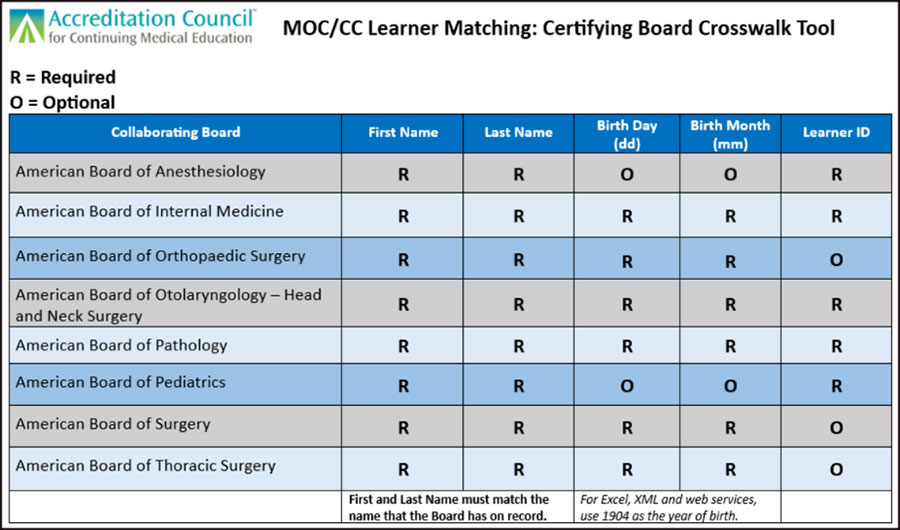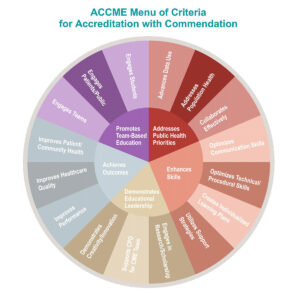Welcome to AOE’s March 2024 edition of AOE Compliance Connection, our monthly newsletter. This month, we bring you sneak peek of what to expect at Thrive 2024, a new chart of resources for MOC/CC board certifications, a quick reminder about Annual Reporting, and the third installment in our series on the trickiest ACCME commendation criteria and how to avoid the pitfalls!
AOE is here to help you! This week, remember to make our compliance tips part of your routine – following us on social media is the easiest way to get helpful tips and other timely updates.

ACCME & Thrive 2024
Thrive 2024, the ACCME’s annual meeting, will welcome together the CME community for three days of education, collaboration, networking, and creativity. To showcase the breadth of the CME world, two speakers are planned for the first and third days of the conference that encompass some of the creativity and ingenuity in professional education.
The conference will kick off with a keynote presentation from Dominic Slauson, Learning Experience Designer from the University of California, Irvine. Slauson will lead attendees into the exciting and relevant topic of artificial intelligence (AI) and its transformative role in CME. Slauson argues that AI can contribute to CME in multiple ways, including crafting content to designing roleplay scenarios. Slauson will also discuss the ethics of AI in CME and offer some strategies and tools for getting started with AI.
Two days later, Joy Allen, PhD, MT-BC will lead the Day 3 Plenary Session on “Music for Health, Music for Life”. Allen is the Director of Berklee College of Music, and the Music and Health Institute and will lead attendees into an immersive exploration into the role of music in the health field. Allen will highlight the synergy between neuroscience, music, health, education, and wellbeing in general.
Learn more about what to expect from Thrive 2024 and how to register, here.

Accreditation Board Bulletin: New Document & Annual Reporting
In its most recent newsletter, the ACCME announced the debut of a new document: the MOC/CC Learner Matching Certifying Board Crosswalk Tool. Based on provider feedback about the required fields for learner matching across all Certifying Boards in the Maintenance of Certification (MOC)/Continuous Certification (CC) Collaboration, this chart was created to help organizations better understand which fields are required and which are optional.
The chart can be referenced and downloaded here.
Annual Reporting
The Annual Reporting deadlines are just a few days away. Make sure your organization has what it needs to each board with which you are accredited:
ACCME: March 31, 2024 Deadline (PARS Information) (FAQ about Annual Reporting)
ANCC: April 1, 2024 Deadline (NARS Information) (Reporting Requirements) (FAQ)
Joint Accreditation: March 31, 2024 Deadline (JA-PARS Information) (2023 Requirements)
ACPE: No Annual Reporting

AOE Spotlight on Commendation: Addresses Population Health Priorities
During accreditation and reaccreditation processes, AOE has assisted many providers in going above and beyond and demonstrating compliance not only with the Core Accreditation Criteria, but also with the Commendation Criteria set forth by the ACCME. All CE providers have the option to seek commendation (a six-year term) and become eligible for this status by compliance with Core Accreditation Criteria and any seven criteria of their choice from any category of the Menu of Commendation Criteria plus one criterion from the Achieves Outcomes category (a total of eight criteria).
Over these months, we’re taking a deep-dive into each of the five categories to highlight specific criteria that historically are most likely to trip up providers during the accreditation process.
In January, we covered Criterion 23 with a focus on IPCE. Last month, we discussed Criterion 27, and focused on the sometimes-nebulous term “population health”.
This month, we continue with “Uses Support Strategies” (Criterion 32), one of four criteria in the “Enhances Skills” category. In this criterion, “The provider utilizes support strategies to enhance change as an adjunct to its CME.”
This criterion is focused on providers that create and make available supplemental services such as reminders, resources like online apps, etc. that reinforce or sustain change. A key requirement of this criterion is to conduct periodic analysis to see if such services are effective and to adjust and evolve them as necessary.
Of the four criteria in this category, “Uses Support Strategies” can be the trickiest for providers to comply with. Often, they report that “utilizes support strategies” seems vague at first, but upon digging into the details, they find they are able to demonstrate it successfully. AOE recommends that providers focus both on the type of strategy and how they are measuring the success of the strategy, because the ACCME specifically requires the CME provider to describe the strategy “as an adjunct to CME activities” AND explain how it “conducts a periodic analysis to determine the effectiveness of the support strategies.”
The strategy can’t simply be a reminder email about the general activity; it should be something that “reinforces or sustains learner change,” according to the ACCME. One good example AOE has seen is an online resource center developed around a series of web-based CME activities. The center includes an e-book and a patient checklist that can be downloaded, as well as an area where physicians can post questions and answers regarding challenging cases they have seen. The provider demonstrated compliance with this criterion by reporting on the number of downloaded materials, as well as the qualitative data obtained from the Q&A.
What are some other ways providers can demonstrate compliance with C32?
The ACCME has posted many examples of compliance and non-compliance which are helpful to providers aiming to design a program worthy of commendation. A few examples are below:
Compliance:
- A provider develops a resource guide for those navigating a certain type of cancer in a certain metropolitan area. The effectiveness of the guide was measured through document downloads within three months of the activity and the results guided the provider’s decision to use the guide going forward.
- A provided develops a series of resources on which it conducts periodic analyses to determine effectiveness/future improvements: poster-sized diagnostic algorithms on disease management, online portal implementation with regularly-updated educational materials, online discussion forums for surgeons, an app for an annual meeting with the option of saving digital notes, and weekly clinical spotlight e-mails to members that include recorded presentations from the provider’s annual meeting.
Non-Compliance:
- A provider develops a mobile phone app that contains course content and asks learners to rate sessions as well as e-mail various communications that announces the availability of the course content and asks learners to take a post-activity assessment. The provider, however, does not demonstrate that these strategies are designed to reinforce or sustain learner change.
- A provider only describes activities that focus on clinical care of individual patients and does not discuss strategies beyond that clinical care to affect population health.
The ACCME has a number of additional resources available on their website, as well. If you are interested in training and/or strategic planning related to commendation, please contact AOE at inquire@aoeconsulting.com.
Upcoming Events
- Getting Started with Joint Accreditation Virtual Workshop
March 28, 2024, Virtual
Read More >> - CPE Self-Assessment Report Preparation Webinar
April 23, 2024, Virtual
Read More >> - CMEpalooza
April 24, 2024, Virtual
Read More >> - Learn to Thrive 2024: ACCME’s Annual Meeting
May 14-16, 2024, Chicago, IL
Read More >>










